
– 14th August 2022 –

Gospel reading today: Luke 12:49-53
vs.49 Jesus said to his disciples:
“I have come to bring fire to the earth, and how I wish it were blazing already!
vs.50 There is a baptism I must still receive, and how great is my distress till it is over!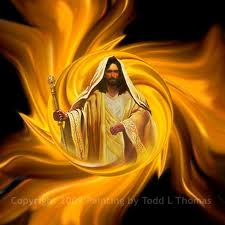
vs.51 Do you suppose that I am here to bring peace on earth?
No, I tell you, but rather division.
vs.52 For from now on a household of five will be divided:
three against two and two against three;
vs.53 the father divided against the son, son against father, mother against daughter, daughter against mother, mother-in-law against daughter-in-law, daughter-in-law against mother-in-law.”
************************************************
We have four commentators available from whom you may wish to choose .
Michel DeVerteuil : A Trinidadian Holy Ghost Priest, director of the Centre of Biblical renewal .
Thomas O’Loughlin: Professor of Historical Theology, University of Northampton.
Sean Goan: Studied scripture in Rome, Jerusalem and Chicago and teaches at Blackrock College
and works with Le Chéile schools
Donal Neary SJ: Editor of The Sacred Heart Messenger
*******************************************************
Michel de Verteuil
Lectio Divina The Year of Luke
www.columba.ie
General Textual comments
The gospel passage for this Sunday is in three sections
– verse 49
– verse 50
– and verses 51 to 53
As I have often recommended, you should meditate on one section at a time. But you will find that in this passage the three sections complement one another; if taken together, they correct any false interpretations which could arise if they were read separately. Think of them, therefore, as parts of a beautifully constructed building in which each part is appreciated in relation to the whole.
Firstly, the metaphor of fire in verse 49 is difficult to tie down, because it is a common one and can be interpreted in many different ways. In fact, it is used with a variety of interpretations in the Bible itself: the tongues of fire representing the coming of the Spirit; the burning fire of love, and so on. 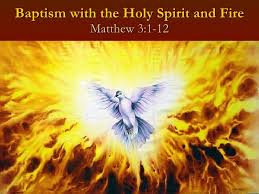 The interpretation probably intended by Jesus in this passage is the one we find in chapter 3 of St Luke’s gospel, where John the Baptist said that the Messiah would come and baptise with the Holy Spirit and with fire, and went on to explain that he would gather God’s pure wheat into the barn and dispatch the chaff to be burnt in a fire that would never go out. In our passage, then, Jesus is at a moment in his life – one that we can identify with – when he is deeply moved by all the chaff in the world, the phoniness, the arrogance, the oppression, and he longs to see it going up in a great bonfire, while true goodness is gathered safely into God’s barn.
The interpretation probably intended by Jesus in this passage is the one we find in chapter 3 of St Luke’s gospel, where John the Baptist said that the Messiah would come and baptise with the Holy Spirit and with fire, and went on to explain that he would gather God’s pure wheat into the barn and dispatch the chaff to be burnt in a fire that would never go out. In our passage, then, Jesus is at a moment in his life – one that we can identify with – when he is deeply moved by all the chaff in the world, the phoniness, the arrogance, the oppression, and he longs to see it going up in a great bonfire, while true goodness is gathered safely into God’s barn.
Secondly, the sayings of Jesus are usually metaphors, speaking to our imagination. You say the words with Jesus, then, getting in touch with the particular form of chaff that makes you indignant
 – hypocrisy, or
– hypocrisy, or
–racism, or
–manipulation
– and getting in touch with the particular part of “the earth” where you see it – your family, your church community, your country or some other country, your own self. Experience with Jesus the blessedness of hungering and thirsting for God’s justice to be realized in the world.
Thank God for those people you have known who saw it as their mission in life (“I have come to…”) to expose evil in one of its hidden forms and refuse to accept it passively as we are inclined to do. Put their names into the verse so that you can experience that the Spirit of Jesus is still in the world.
There is a danger that we will read verse 49 self-righteously or fanatically, and it has often been read like this, Christians covering up a natural hardness or intolerance with the pretence that it was the will of God.
Verse 50 comes, therefore, as a corrective. Jesus is anxious to cast fire, but he took no pleasure in this; he expressed his feelings with the metaphor of a baptism with which he had to be baptised, not referring to the sacrament, but using the word in its original sense of drowning. He felt he was being thrown into a dark abyss and he was afraid. Identify with him at this moment. All his life has been leading here, he knew it was the only way to go, that he would be bringing new life for the world, and yet, he was afraid. This was the moment the synoptic gospels recorded as the agony in the garden and St John in Chapter 12 verse 27:
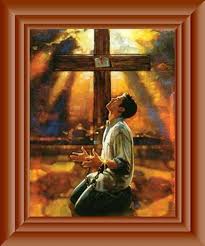 “Now my soul is troubled.
“Now my soul is troubled.
What shall I say:
Father, save me from this hour?
No, it was this reason that I have come to this hour.
Father, glorify your name.”
The Epistle to the Hebrews also describes this moment:
“He offered up prayer and entreaty, aloud and in silent tears to the one who had power to save him out of death.”
The prophet Hababuk had the same feeling as he waited for a moment of grace:
“My whole body trembles, my lips quiver at the sound;
decay creeps into my bones, my steps falter beneath me.”
Be with people who are living that moment, knowing that they are doing the right thing and yet insecure and afraid of the hurts they will cause others, “carrying with them in their bodies the death of Jesus,” as St Paul described it.
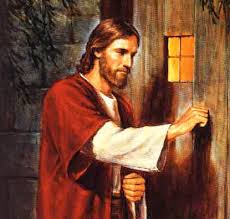 Finally, enter into the movement of verses 51-53, with its “do you suppose?” and “no”. Remember a time when you took for granted that the teaching of Jesus was going to make life easier for you, and someone or some event brought you up short, hitting you with the realization, “Hey! It isn’t like that at all.” That was Jesus entering your life.
Finally, enter into the movement of verses 51-53, with its “do you suppose?” and “no”. Remember a time when you took for granted that the teaching of Jesus was going to make life easier for you, and someone or some event brought you up short, hitting you with the realization, “Hey! It isn’t like that at all.” That was Jesus entering your life.
Respond to the concreteness of the teaching. It is a family of five: mother, father, a married son with his wife and a daughter, and they are divided three against two and two against three. Let the repetitiveness touch you so that you experience the continued pain and the frustration of the division. Then bring Jesus into the story, looking on at that painful situation and saying that it is what has to be. See him as the great leader,
not hiding the facts,
nor abdicating his responsibility,
and thank God for people you have known who were like that.
Prayer Reflection
Lord, we thank you
that you know there is a fire you want to bring to the earth and you wish it were blazing already.
We know that you did not come to bring peace on earth but rather division.
We thank you for the times when you brought some separation between us and people we knew were very close to us.
******************************************
Thomas O’Loughlin
Liturgical Resources for the Year of Luke
www.Columba.ie
Introduction to the Celebration
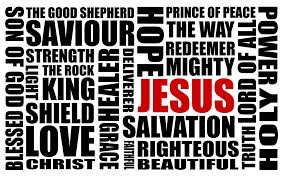 Dear Friends, each week we gather in union with Jesus, the Christ, the Anointed One, the Son of the Father, the Word made flesh and listen to his words, share his table, and join our lives with his great act of thanksgiving to the Father. But how often do we ask ourselves have we an adequate image in our minds of who it is we are following as Christians? Today the readings pull us up short and ask us to deepen our understanding of Jesus. We often think of Jesus as ‘the man of peace’; but today we hear that he is a prophet who came to bring division rather than peace. We sometimes reduce our understanding of Jesus to being some kind of moral teacher
Dear Friends, each week we gather in union with Jesus, the Christ, the Anointed One, the Son of the Father, the Word made flesh and listen to his words, share his table, and join our lives with his great act of thanksgiving to the Father. But how often do we ask ourselves have we an adequate image in our minds of who it is we are following as Christians? Today the readings pull us up short and ask us to deepen our understanding of Jesus. We often think of Jesus as ‘the man of peace’; but today we hear that he is a prophet who came to bring division rather than peace. We sometimes reduce our understanding of Jesus to being some kind of moral teacher
with a few ‘general simple truths’, but today we hear that Jesus, the Son of God, is ‘the pioneer and perfecter of our faith, who for the joy that was set before him endured the cross, despising the shame, and is seated at the right hand of the throne of God.’ Now, assembled in his presence, let us ask him to give us a deeper understanding of himself and his good news.
Gospel Notes
Although this statement by Luke is more fulsome, this material is also found in Mt 10:34-36, and has been a source of anguish to preachers for centuries. If one accepts this as a basic verse within a Christology, then the result is a messiah who comes to lead just a few people who accept his message in a form that revels in any clash with the times and the cultures in which people live. On the other hand, if one relegates these verses it could appear that one is praising peace at the price of compromising the word of God. Moreover, it was only with the advances in hermeneutics in the twentieth century that this sort of dilemma was successfully transcended.
But very briefly, we can view these collections of sayings (in Matthew and Luke) in this way.
First, the starting point is the actual opposition to Jesus during his ministry, which has continued into the time of the church in opposition to those who embrace its teachings about Jesus. The fact is the opposition, and with this the fact that friendships are being broken and so are bonds of loyalty within families.
Second, this is acknowledged in words by Jesus and the format of these words is a form of exaggeration that makes the point that the opposition is inevitable. He not only accepts it has happened, but knew ‘all along’ that it would happen; indeed, he wishes it to happen as it would make sure that people were coming to a decision about discipleship.
The problem with this text is that the statements taken as ‘words from the bible’ or ‘the plain words of Jesus’ can, within a popular biblical hermeneutic, be taken as a justification for assessing religious ideas as being those which are most likely to provoke opposition in the larger society. This effectively confuses the necessary counter-cultural stance that Christians need to take on specific points with an attitude of being awkward ‘for Jesus’, on the assumption that the larger society is inherently sinful and corrupt.
Homly notes
1. A homily at a Sunday Eucharist is not a suitable occasion to tackle the difficulties of today’s gospel; the backgrounds of the average congregation are too diverse to assume any of the levels of understanding to deal with this complex gospel theme; and even if the congregation has a great many people who have a good familiarity with the gospels and their exegesis, there is not the time in a homily to grapple with these five verses. However, one can use the gospel reading as a peg to hang an exploration of the question ‘Who is Jesus?’ that is accessible to an average assembly. In this case one reads the gospel as a ‘wake-up call’: so you think you know about Jesus and his message? Well, just look at this text with its prediction of family strife which is so much at variance with much Christian preaching on the family. So you think you know his message of peace, then look at what this text says. So you think that the Christian gospel can be boiled down to some general set of ‘great moral truths’ — which are more or less the same in every religion but it just so happens that we hear them in the ‘Jesus version,’ then now look at this text and ask if Jesus fits neatly into your box.
2. If the congregation is a small one, then one can ask them to list all the different names and titles we give to Jesus. The resulting list then can form the basis for the homily. However, if the gathering is large, uncomfortable with the idea of participating in the homily, or is just generally reticent, then you can provide a list of your own. The idea is to note the complexity of the list, and then see how the various names/titles! designations relate one to another.
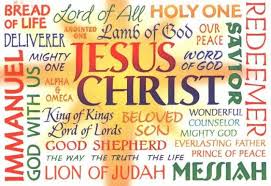 3. Here is a list I have drawn up. I have come up with 50 names / titles in no particular order: Jesus Christ; the Christ; Christ; Messiah; Anointed One; Son of David; Son of Man; Son of God; Light; Light from light; Fisher of men; Shepherd; Man; King of the Jews; Sacred Heart; Prince of Peace; Son of Mary; Logos; Word; Word made flesh; Bread of life; The Crucified; The Man of Sorrows; Second Person of the Trinity; Guide; Carpenter’s son; Alpha and Omega; Saviour; Conqueror of sin; Redeemer; King; the Infant of Prague; King of Kings; God; Priest; Prophet; Lord; Liberator; Son of the Father; High Priest; Master; Rabbi; Teacher; Healer; Lamb of God; Victor over death; Sovereign; Brother; Friend; ‘the pioneer and perfecter of our faith’. We could keep going as any number of other images and titles have been given to Jesus within the life of the People of God; but probably in this list you will find all the common ones.
3. Here is a list I have drawn up. I have come up with 50 names / titles in no particular order: Jesus Christ; the Christ; Christ; Messiah; Anointed One; Son of David; Son of Man; Son of God; Light; Light from light; Fisher of men; Shepherd; Man; King of the Jews; Sacred Heart; Prince of Peace; Son of Mary; Logos; Word; Word made flesh; Bread of life; The Crucified; The Man of Sorrows; Second Person of the Trinity; Guide; Carpenter’s son; Alpha and Omega; Saviour; Conqueror of sin; Redeemer; King; the Infant of Prague; King of Kings; God; Priest; Prophet; Lord; Liberator; Son of the Father; High Priest; Master; Rabbi; Teacher; Healer; Lamb of God; Victor over death; Sovereign; Brother; Friend; ‘the pioneer and perfecter of our faith’. We could keep going as any number of other images and titles have been given to Jesus within the life of the People of God; but probably in this list you will find all the common ones.
4. When we take any such lists we notice that (1) they can be seen to belong to various frames of reference; and (2) that all these names have to be co-coordinated to one another.
5. Just to keep it neat, I break these into seven boxes:
First, we have names that are used by Jesus or of Jesus in the four gospels: the Christ (= Messiah; Anointed One); Son of David; Son of Man; Man; King of the Jews; Son of Mary; Bread of life; Carpenter’s son; King; Prophet; Lord; Master; Rabbi; Teacher Lamb of God.
Second, we have names that have been used since the first generations of Christians: Son of God; Light; Shepherd; Prince of Peace; Son of Mary; Logos; Word; Word made flesh; Bread of life; The Crucified; The Man of Sorrows; Alpha and Omega; Saviour; Conqueror of sin; Redeemer; King; God; Priest; Prophet; Lord; Son of the Father; High Priest; Master; Rabbi; Teacher; Healer; Lamb of God; ‘the pioneer and perfecter of our faith.’
Third, we have names that are derived from our reflection on the history of salvation: Messiah Anointed One; Son of David; Son of Man; Prince of Peace; The Man of Sorrows; King; King of Kings; Priest; Prophet; Lord; High Priest.
Fourth, we have names that have to be linked with one another if they are not to be found wanting: ‘Son of God’ with ‘Son of Mary’; ‘Man’ with ‘God.’
Fifth, we have names that are used in the church’s formal expression of faith: Light from light; Second Person of the Trinity; Redeemer.
Sixth, we have names that come from popular devotions:
Sacred Heart; Infant of Prague. Divine Mercy
Seventh, we have informal names, but which capture essential aspects of our faith: Shepherd; Guide; Carpenter’s son; Liberator; Teacher; Healer; Brother; Friend.
6. The ways we could group the names is endless; just as we could keep adding to the list. The need for all these names is that the person at the centre of our faith exceeds all our understanding. A mystery is not a puzzle, but a reality so beyond our understanding that we have to keep trying to grasp it, now this way, now that. But these various glimpses must always be used in ‘both-and’ mode, rather than in the ‘either- or’ mode, of understanding. The ‘either-or’ mode is suitable for ordinary everyday objects of understanding; but if ‘to understand’/’to appreciate’ another person we might meet every day in the flesh we need to use the ‘both-and’ mode, how much more is this true of our seeking the one who came ‘to bring fire upon the earth.’
7. No group’s list, nor individual’s list, will be the same as any other, but what is included and what is missed out may provide a glimpse into that group’s or individual’s level of religious awareness and spirituality.
********************************************
Sean Goan
Let the Reader Understand
www.Columba.ie
Gospel notes
The idea that the kingdom of God is both a gift and a challenge is very present in the extract from the gospel that is put before us today. The encouraging opening words inspire confidence in the hearers as Jesus reminds his ‘little flock’ that there is no need for fear because the kingdom has been given. So if the disciples are not to fear, what should they do?
Jesus answers this question in a most challenging way by telling them to think differently about the world and their place in it. They should not be concerned about wealth or the exercise of power; rather they should busy themselves doing what the Lord asks of them as any good servant would do. Jesus puts it to his disciples very sternly — much has been given you, so much will be expected from you. This is not to inspire fear but to inspire reflection on how gifted we truly are.
Reflection
 Both today’s readings highlight the meaning of faith, and stress that it has more to do with trusting in God than it has with believing certain truths. On the night of Passover the Israelites, who were a powerless band of runaway slaves, were escaping from the greatest empire in the world. They were heading out into the wilderness not knowing their final destination. Equally Abraham and Sarah were asked to set out for a land they did not know and to leave everything with which they were familiar. In following Christ, we too are asked to take God’s hand and to follow a path which is often at odds with the values of the world in which we live. We are to be Christ’s instruments as he reaches out to those most in need.
Both today’s readings highlight the meaning of faith, and stress that it has more to do with trusting in God than it has with believing certain truths. On the night of Passover the Israelites, who were a powerless band of runaway slaves, were escaping from the greatest empire in the world. They were heading out into the wilderness not knowing their final destination. Equally Abraham and Sarah were asked to set out for a land they did not know and to leave everything with which they were familiar. In following Christ, we too are asked to take God’s hand and to follow a path which is often at odds with the values of the world in which we live. We are to be Christ’s instruments as he reaches out to those most in need.
****************************************************
4. Donal Neary S.J.
Gospel reflections for Year C: Luke
www.messenger.ie/bookshop/
Disturbing love and the warmth of love
Fire is frightening; it can burn up a city. Controlled it is warming: in control in a grate; and it also warms the heart, when we sit back, watch the flames and chat, think or pray. Jesus came to bring fire on the earth. His is the warmth of love and companionship: when we know we can go to him just as we are, and enjoy the intimacy of his friendship – the friend who is always offering the gift of his heart to each of us.
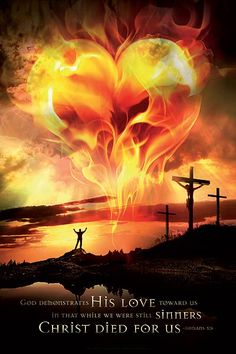
The warmth of Jesus brings comfort and hope to the world when we live in isolation from each other, lack of friendship and hope. When we lack the reconciliation and justice that makes life possible among us, then the warmth of God’s love for all can inflame our coldness.
There is also the fire that disturbs; love challenges as well as comforts.
The flame of God can be frightening in that it demands a world of justice, peace and reconciliation. The fire of this love is the fire that also warms and comforts.
The flame of God is the Holy Spirit. Jesus comes to bring all sorts of fire to the world, and to send the Spirit of comfort, justice, reconciliation and hope. The message of Jesus may divide us, and if it does, the love of Jesus can unite us, for love is the most powerful gift of Jesus.
A saying has it — he has come to afflict the comfortable and comfort the afflicted.
Holy Spirit, flame of God, hover over each of us
asyou did for the followers of Jesus
at the first Pentecost.
*******************************